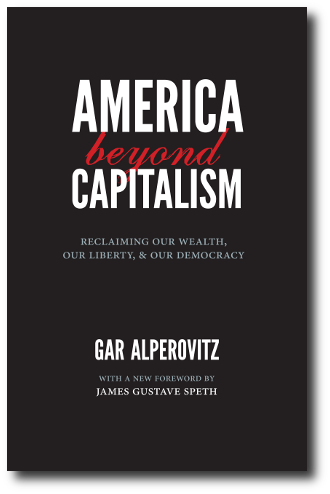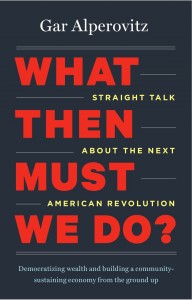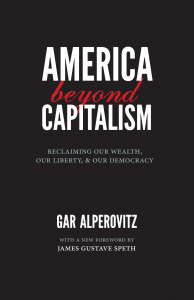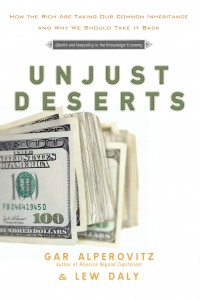
This interview originally appeared on Solidarity Hall
To begin with, tell us about the Democracy Collaborative’s focus on community wealth-building. How can that be done?
We also use the term community-sustaining economy—and we’re interested in forms that build democracy, community and equity. In smaller companies, we know that worker ownership is a useful device. Indeed, we are strong supporters of worker coops and worker-owned companies in general. In large firms, worker ownership in some industries might produce different equity results. That is, the larger community has a stake in the impact of their operations. And we’ve been interested in how you can blend these different interests most successfully.
The problem with pure worker ownership of large industries is that the worker/owners are under the same market pressures as any other company. They are therefore as likely to pollute the environment, for example, if they’re under competitive pressures to do so, as the next guys. So that means the worker-owned company’s interests are somewhat different from that of its surrounding community—which includes elderly people, young people, all those who happen to be out of the workforce. After all, half the society at any one time is not part of that worker ownership.
So we think it’s critical, to use economists’ language, to begin to internalize the externalities through structures that reflect the broader community’s interests, rather than putting workers’ interests at odds with them. The Evergreen Cooperatives in Cleveland, for example, is a key initiative that reflects this worker-community model, and which we helped design.
Back during the Occupy protests a year or so ago, you published a NY Times op-ed on the quiet revolution in worker ownership that has been growing in recent years and yet has been little noticed.
Well, to start with, the national media doesn’t cover much at the local level—they don’t have the resources any more to do so and that’s getting worse, not better. So it’s not surprising that people don’t know about this development.
But part of what’s driving these experiments—in worker ownership, cooperatives, and other hybrid forms– is the fact that so much economic failure is occurring: an historical process is behind this. So there are now ten million Americans who are worker-owners at their companies—about three million more than there are members of private sector unions, in fact.
Some 130 million people now belong to a co-op or credit union. Neighborhood owned corporations number between four and five thousand. There are several thousand social enterprises, increasing numbers of B Corporations, growing numbers of city- or neighborhood-owned land trusts.
These new forms are often following functional lines. So that neighborhood ownership makes more sense for housing, for example.
Take the concept of municipal ownership which was favored when appropriate in its earlier days by the Chicago school of economics. There are around 2,000 municipally owned utilities around the country, with several new municipalizations in recent years.
There’s also the Cleveland model, which is being applied in other cities—again, largely and simply because the other business models are failing before everyone’s eyes, just as are traditional liberalism and traditional conservatism.
And more importantly, I think, people are now beginning to ask, where does this all lead to in our larger political-economic system?
You argue in your most recent book that reform is not enough. We need to change the very structure of wealth-holding institutions—by creating more public banks, for example. Is that happening?
Yes, the idea of public banking is making strides and is going to make more. And again, it’s because of the failures. The so-called Dodd-Frank Wall Street Reform Act has been in effect for some time now. But instead of controlling the behavior of the big banks, they’ve only gotten bigger and are taking even bigger risks. The numbers here are quite extraordinary.
We want a model that begins with decentralization and the principles of community and with the recognition that creating local community requires stability. That means people anchored in a place where they can flourish, rather than being forced to move, as was the case with millions of residents of Detroit or Youngstown. Cleveland was once 900,000 in population; it’s now less than 400,000. How can you have democracy when people are totally uncertain about their economic future? So stability is required.
With regard to the financial system, you notice the big banks distanced themselves from local communities a long time ago. They’ve likewise gone in for dangerous levels of speculation, claiming that they’re more efficient thereby. This claim, even if it were true internally, is contradicted by the fact that they are extraordinarily wasteful in terms of the larger system problem here. They are capable of creating tens of trillions of dollars of losses when they fail.
In the earlier days of the Chicago School of economics, which I have considerable respect for because of its rigor and integrity in that period, they faced the fact that many big banks and indeed corporations were not supportive of communities. These economists—I’m speaking here of Henry Simons, Milton Friedman’s teacher and others—wrote important reports calling for nationalization in certain cases, on the principle that some firms could not be regulated. This group understood regulatory capture very well, realizing further that even if you broke these institutions up, they would simply find a way to regroup and be back at the same game again.
Interesting—so you’re saying the early Chicago school had a sense of human scale?
Absolutely. They began from the community. I would put it this way: if you can’t have democracy with a small D in the communities, you’ll never have democracy with a big D in the continental system. I think Henry Simons had exactly that view. I have differences with that school in more recent times but I think that on this front they had a very great deal to teach us.
The Evergreen Coops in Cleveland make reference to the Mondragon Cooperative Corporation in Spain, an enterprise that was founded by a Catholic priest on Catholic social principles. The Cleveland project is purely secular in nature but it seems to retain much of that spirit. Were you instrumental in bringing the Mondragon model to bear in Cleveland?
It’s an interesting tale. There are very powerful roots of cooperative thinking in Catholic social thought in general, leaving aside Mondragon. In some ways, however, we at the Democracy Collaborative had already been working on finding ways of using the procurement process at public institutions—hospitals and universities in particular—as a way to create and stabilize jobs that represented some form of worker or neighborhood or community ownership. All this was quite independent of Mondragon. It was only later in the project that we began to see things we could learn from Mondragon, such as how to implement a revolving fund in the various cooperative structures.
We were also interested in building a community-wide structure which is not a Mondragon idea, since it is not a community organization. MCC is a corporation, a group of cooperative enterprises.
In the U.K., the Cameron government was for a time promoting a vision of the Big Society as a way of regenerating local communities. One of the more visible proponents of this bottom-up vision of civic renewal was the social philosopher Phillip Blond. Any thoughts on this Big Society initiative?
I’m certainly aware of Blond and have a general sense of his work. When we think about community—and I have favorably quoted the work of Robert Nisbet also on this subject—we sometimes come up against the difficulty that when some groups pursue community-building, they tend to avoid the harder economic issues. I think that’s a real danger for some of communitarian thought, the tendency to leave to one side these important economic issues.
You’ve spoken and written about the importance of regionalism in regenerating our communities. Tell us a bit more about why this regional angle of approach matters.
There’s a great body of work on this subject, going back to the beginnings of the twentieth century and particularly around the 1930s. And the argument here is quite simple. Just consider the sheer size of this country, compared with the other developed nations in the Western world. It surprises people to learn that you could tuck Germany into the state of Montana or fit France comfortably within the state of Texas. The difference in scale is one of the reasons European politics are in a sense so much easier.
We, on the other hand, have some 315 million people spread out over 3.5 million square miles. We are headed toward 500 million people and thus the argument for decentralizing. If most states are too small and the continent itself is too large, what’s left –if democracy is to flourish–is the intermediate unit, the region.
I don’t know if you know the work of Alberto Alesina, an economist at Harvard who co-authored a book called The Size of Nations. He and his colleagues have been looking at the economic effects of scale, a topic which has not received much attention for decades. I wrote an op-ed piece for the New York Times several years ago on the possibility of California leading the way toward this kind of devolution and I explained why I thought it had to happen: as the only way to avoid the mounting inefficiencies, political and economical, which occur when states become too large. So I see recent developments tending to confirm regionalism from converging angles.
You mention that in a systemic crisis, not just new proposals but new thinking is needed—something we hope to do here with Solidarity Hall’s interactions. I think you might also in agree that crisis can create solidarity—is that fair to say?
Yes and I would add another factor: growing distrust of large institutions, especially in the areas of government and politics. There are two ways to think about new ideas. First, we certainly need them and I would agree with what you suggest in your question. But second, and I think more interestingly, these systemic failures are part of a historic process which itself is forcing us to realize the need for new ideas. The pain levels are getting quite high and the failures are great. I write books and articles and do research and so I’m very much in the business of ideas. But in fact I don’t think ideas matter much most of the time. Power and momentum matter.
But there are times when things are breaking down—and this is such a period—when ideas do matter and people are forced to think about things.
You have a new book coming out shortly. Please give us an idea of the subjects you’ll be taking up there.
Sure. The title is What Then Must We Do?, a phrase taken from Tolstoy. I suggest that traditional liberalism, traditional conservatism and traditional radicalism are now at a dead end. We are in a strange form of crisis which will neither end in societal collapse (as in the Marxist model) nor success (as in the liberal model) nor in some conservative model. Instead we’re caught in a never-never land of sustained stagnation and decay—which I argue is a very unusual societal context, being neither reform nor collapse. I think we’ve been in this context for some time now.
Amidst the pain, this situation has one advantage. Since we don’t appear to be headed toward dramatic change in any direction, we do appear to have time to think. And thus all these new initiatives we’ve been discussing here—a whole rich, new debate has started up in this country.
Moreover, as I argue in the book, we are potentially in the pre-history of truly fundamental change, beyond traditional corporate capitalism, beyond state socialism. So all this experimentation is very important and it could be laying the foundations of something for the long-term.
If America is, as it’s sometimes called, a laboratory of democracy, then some of these principles, even at a small stage in local “laboratories,” can eventually be applied at other levels. This is the kind of important groundwork that was done prior to the New Deal, prior to women getting the vote, prior to the Progressive Era itself.
 AMERICA BEYOND CAPITALISM
AMERICA BEYOND CAPITALISM



 Agenda
Agenda  Posterboard
Posterboard 